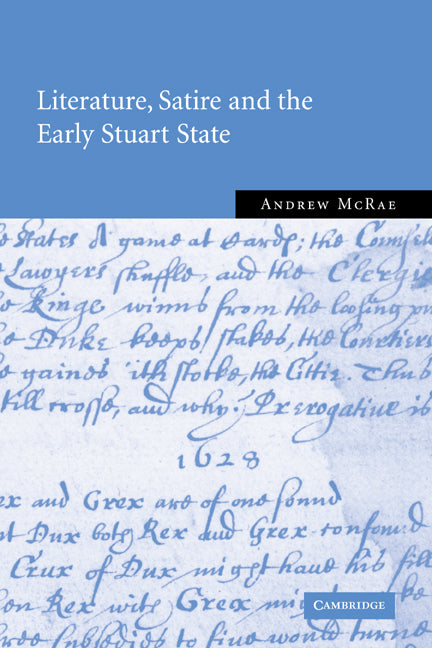Freshly Printed - allow 8 days lead
Couldn't load pickup availability
Literature, Satire and the Early Stuart State
Andrew McRae examines the relation between literature and politics at a pivotal moment in English history.
Andrew McRae (Author)
9780521814959, Cambridge University Press
Hardback, published 12 January 2004
264 pages
22.9 x 15.2 x 1.9 cm, 0.56 kg
"This is historically informed criticism that nonetheless retains a keen eye for the habits and patterns of teh words used by the writers it studies. By making available such an important body of primary materials for the study of politics, textuality and culture, Early Stuart Liberals open-handly extended an invitation to otehr researchers; Literature, Satire and the Early Stuart State will offer those new to that field not only a learned and approachable guide, but, beyond that, a model of how these texts interact with one another and the richly described cultures within which Mcrae situates them." Early Modern Literary Studies Tom Lockwood, University of Birmingham
Andrew McRae examines the relation between literature and politics at a pivotal moment in English history. He argues that the most influential and incisive political satire in this period may be found in manuscript libels, scurrilous pamphlets and a range of other material written and circulated under the threat of censorship. These are the unauthorised texts of early Stuart England. From his analysis of these texts, McRae argues that satire, as the pre-eminent literary mode of discrimination and stigmatisation, helped people make sense of the confusing political conditions of the early Stuart era. It did so partly through personal attacks and partly also through sophisticated interventions into ongoing political and ideological debates. In such forms satire provided resources through which contemporary writers could define new models of political identity and construct new discourses of dissent. This book wil be of interest to political and literary historians alike.
Acknowledgements
Conventions
List of abbreviations
Introduction
Part I. Personal Politics: 1. The culture of early Stuart libelling
2. Contesting identities: libels and the early Stuart politician
Part II. Public Politics: 3. Freeing the tongue and the heart: satire and the political subject
4. Discourses of discrimination: political satire in the 1620s
Part III. The Politics of Division: 5. Satire and sycophancy: Richard Corbett and early Stuart Royalism
6. Stigmatising Prynne: Puritanism and politics in the 1630s
Epilogue: early Stuart satire and the Civil War
Bibliography
Index.
Subject Areas: Literary studies: c 1500 to c 1800 [DSBD]


